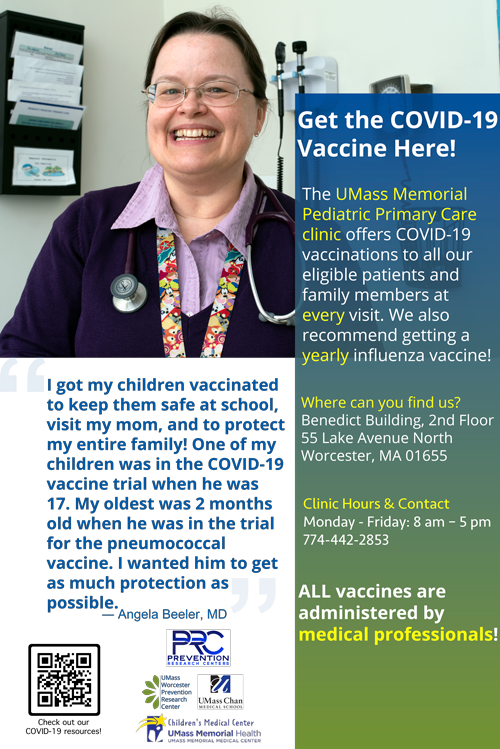
The front line in the battle against COVID-19 now encompasses the hospital setting as well as the community, where the UMass Chan Prevention Research Center is working with partners to promote vaccination, track infections and tackle social determinants of health affecting vulnerable groups.
“What we’re doing now builds off of all the strong relationships that the Prevention Research Center has had with community partners since we were first funded in 2009,” said Stephenie P. Lemon, PhD, the Marcellette G. Williams Scholar, professor of population & quantitative health sciences and co-director of the Prevention Research Center. “We’ve been working with the Worcester Division of Public Health, the Worcester Office of Health & Human Services, the state Department of Public Health and others since the very beginning to provide epidemiologic infrastructure, data and evidence-based support.”
One major push has been to promote acceptance of COVID-19 vaccines and boosters among youth, children and families through a vaccine ambassador campaign that is grounded in local vaccination data, parent voices, behavior change theory and evidence-based practice. It is co-devel
oped through partnerships with the Worcester Office of Health and Human Services, the Worcester Division of Public Health and many other organizations.
The vaccine ambassador campaign focuses on the words of trusted messengers, people relatable to the community who can talk about the reasons why they decided to be vaccinated against COVID-19.
With support from the U.S. Centers for Disease Control and Prevention, UMass Chan researchers and partners developed an intervention to address vaccine hesitancy featuring youth as vaccine ambassadors in the community, particularly those who are at high risk of severe illness and less likely to get vaccinated. This training produced the multimedia #PostVaxLife campaign, with posters, fliers, billboards, public service announcements and bus signs featuring vaccine ambassadors sharing their motivation to get vaccinated and directing people to the vaccine clinic at the Worcester Public Library.
“The idea behind it is that people learn through messaging, and they like to hear from people like them,” said Dr. Lemon. “That’s a really effective health promotion technique and so we built an entire campaign starting with those young adults.”
Walk into the Benedict UMass Memorial Pediatric Primary Care offices on the University Campus and you will see posters of physicians, nurses and nurse practitioners, and a Spanish-speaking pediatrics resident saying why their families received the COVID-19 vaccine and why they encourage others to do so. The posters are one response to parents’ desire to hear more about vaccines from their child’s health care provider.
The Prevention Research Center’s poster campaign, accompanied by an evidence-based approach to talking with families, was embraced by the pediatrics group for a few reasons, explained Angela L. Beeler, MD, associate professor of pediatrics and division chief of general pediatrics.
“First of all, everybody should know up front that we are very pro-vaccine, so I feel it helps prepare families that we’re going to have this conversation,” she said. “I also think, in a completely different vein, it’s just nice to have pictures with names and faces, because often in a big clinic like ours, it can be hard to remember who people are.”
Dr. Beeler said approximately half of eligible children in the practice have been vaccinated. The response from parents has been “all over the map,” from parents eager to get children vaccinated as soon as they are eligible, to resistance.
While the pediatrics messaging campaign is nearing completion of its formal evaluation, anecdotal reports suggest it shows promise to reduce vaccine hesitancy. “We’ve had a few who comment about the posters, and one of them told a nurse that she saw the poster and it made her feel really comfortable then getting the vaccine,” said Beeler.
Lemon said the Prevention Research Center has applied for continued funding to extend the research of their messaging work with pediatric practices and they hope to expand the initiative across the state.
More recently, the UMass Chan team partnered with You, Inc., which is an affiliate of Seven Hills Foundation and the Greater Worcester Community Foundation, to train, support and evaluate a network of family vaccine ambassadors to speak with other parents in targeted communities.
Sixteen family vaccine ambassadors in Worcester and two in Southbridge were recruited and trained, according to Amy Borg, MPH, Med, UMass Worcester Prevention Research Center deputy director. Each ambassador was to reach out to 10 to 20 families. The initiative ended in late June, with plans for participants to discuss what went well and make recommendations for improvement.
Besides promoting vaccines through trusted-messenger campaigns, the Prevention Research Center has grown its work in public health infrastructure, including case counts and vaccination surveillance in the greater Worcester region.
Another major effort has been to understand and address health disparities among traditionally marginalized populations, which have been exacerbated by the pandemic, Lemon said. Vulnerable groups have faced more food insecurity, housing challenges, barriers to health care, and reduced or riskier employment. A survey conducted in 2020 and focus group series conducted in 2021 by the Prevention Research Center highlight these discrepancies.
“We have shared that data with the local coalition and the city of Worcester to understand and prioritize how they are using ARPA (American Rescue Plan Act of 2021) funding,” said Lemon.
Despite challenges brought by the pandemic, “The commitment and the collaboration that we’ve seen in the community has just been remarkable,” Lemon said. “To have our center be part of that community response has been really valuable and exciting.”
The Prevention Research Center has since 2009 been a member of the Prevention Research Center (PRC) network funded by the CDC, addressing public health challenges across Massachusetts, and serving as a national model for research that connects academia, public health, community and health care systems.
Related UMass Chan news stories:
UMass Worcester Prevention Research Center funding renewed
UMass Medical School working with community to address vaccine hesitancy in Worcester
Greater Worcester COVID-19 Community Health Survey underway